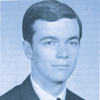David Tucker Scott – 50th Reunion Essay
David Tucker Scott
 19009 88th Place NE
19009 88th Place NE
Bothell, WA 98011-2268
dtscott.omni@frontier.com
Spouse(s): Marilynne Scott (1978)
Child(ren): Patience Alexandra Schell (stepdaughter) (1970); Emily Margaret Duckworth Scott (1980).
Education: Yale BA ’69; Yale MS ’74; Yale PhD,’’78
Career: Psychologist: Yale Dept Pediatrics; Univ of Washington Dept Psychiatry; Social Security Administration
Avocations: Travel, “physics for poets”, progressive political issues
College: Trumbull
Right after Yale College, I started grad school in psychology at Yale. Later on, my advisor (William Kessen) took a sabbatical year, which I used to study “mental philosophy” at the University of Edinburgh. After Edinburgh, I began a Yale Child Study Center clinical internship. Then back to the dissertation! With data from 400 infants, there was statistically-significant evidence that human speech perception involves neurological mechanisms that are innate and not learned. I finished in 1977, receiving a Yale PhD in 1978.
With the dissertation completed, the former Marilynne Schell was willing to marry me! Our ceremony was in the Yale Divinity School chapel, with Bill Coffin officiating. I thus became step-father to Marilynne’s eight-year-old daughter from her first marriage, Patience Alexandra (“Sasha”). Marilynne and I went to Scotland on our honeymoon.
In 1978, I began a four-year NIH postdoctoral fellowship in the Yale Pediatrics Department. I developed a follow-up clinic for infants who were discharged from the NICU at Yale New Haven Hospital. After the fellowship, I became the only clinical PhD on the Yale pediatrics faculty.
In 1980, our daughter Emily was born. More about family below.
A highlight of my career was the Infant Health and Development Program (IHDP), a multisite randomized clinical trial of intervention services for low-birthweight infants. The IHDP was funded primarily by the Robert Wood Johnson Foundation and NIH. I served as site director for the Yale site and also on the national steering committee. We enrolled over 1,000 infants across eight US sites, following them for 18 years (with minimal loss to follow-up). At the end of the intervention at age three, there were large treatment effects for IQ, with more modest effects for behavior measures. The effects diminished over time once the intervention ended, unfortunately.
In 1992, I was offered a similar NICU-follow-up job in the psychiatry department at the University of Washington in Seattle. I remained site director of the IHDP Yale site, made possible by dedicated staff back in New Haven. Moving to Seattle allowed us to be closer to Marilynne’s ageing mother in Vancouver, British Columbia.
I retired from the University of Washington in 2013. Now I work part time as a contractor for the Social Security Administration, reviewing disability applications with mental allegations.
After many years of public-school teaching, Marilynne retired in 2012. Subsequently, she has been involved in knitting groups, a book club, and an Episcopal education program. She volunteers at our Seattle parish, St. Paul’s Episcopal Church.
Sasha is now a professor and chair of the Hispanic studies department at Scotland’s University of Aberdeen. Her research takes her to Mexico and Chile. Her husband Stuart is also on the faculty at the University of Aberdeen.
Emily earned her M.Div. degree at the Yale Divinity School. Her first job after Yale was at Riverside Church in New York City (where Bill Coffin went after he left Yale). In 2008, Emily started St. Lydia’s Dinner Church in Brooklyn, New York. She is now embarking on a similar challenge in Baltimore.
If the above is blank, no 50th reunion essay was submitted.
